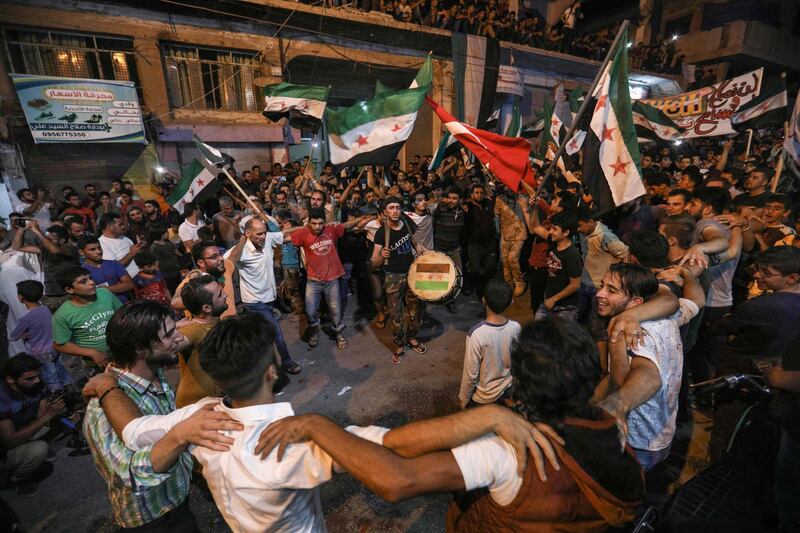The mortars are still falling in Idlib and it appears that no amount of diplomacy can stop them. Still, Syrians in the last rebel-controlled province are trying.
Over the weekend, tens of thousands of Syrians in Idlib took to the streets, calling on the outside world to halt an expected regime and Russian-backed assault on the province. Across dozens of towns, they protested to warn the world that they are trapped, between the Syrian regime on one side and a looming Russian attack on the other.
Yet it can seem as if only two voices really matter: those of Recep Tayyip Erdogan and Vladimir Putin, who met yesterday in Sochi to thrash out a compromise. For the first time in weeks, they spoke with one voice: there would be no large-scale attack on Idlib province, at least for now.
The detail of the deal agreed by Mr Erdogan and Mr Putin remains unclear. It will probably only become clearer as it is created on the ground. In broad terms, the two leaders agreed to carve out a 15 to 20 kilometre demilitarised zone between the forces of the Syrian regime and those of the Turkey-supported rebels. Troops from both countries would patrol this buffer zone.
The Sochi meeting was the culmination of a week of frantic diplomacy. Yet for all the relief the deal has created, it does not solve the fundamental issue of the crisis: what will be done to respect the wishes of the three million people of Idlib? It is not a question anyone in the international community has cared to answer. The province has become a problem to be solved, not a people to be saved.
Ever since a three-way summit between the leaders of Russia, Iran and Turkey ended two weeks ago, without an agreement on a ceasefire, the outside world has begun to take the possibility of an all-out assault on Idlib seriously. The last week has seen frantic diplomatic and military moves as countries started to absorb and prepare for the implications.
Turkey took a two-pronged approach to the crisis, preparing militarily while also seeking a diplomatic solution. Tanks and heavy artillery crossed the border and the military warned that any attack on Turkey's observation posts in the province would be considered an attack on the country itself and would elicit "the necessary retaliation".
At the same time, Mr Erdogan warned that the consequences of any humanitarian crisis would be felt in Europe as well as Turkey. Over the weekend, representatives from France and Germany went to Ankara to discuss the consequences of a further refugee exodus. Even the US, which has previously taken a hands-off approach, appears to have changed tactics in recent weeks, with State Department representatives travelling to Brussels in the past few days for meetings on the matter.
If this new Russian-Turkish agreement has opened up some room for manoeuvre, it has also raised difficult questions. Depending on how the buffer zone is drawn, it could well encompass the city of Idlib, a bewildering maze of streets that has already played host to clashes between militant groups. It is not at all clear that removing all the weapons from this city is a task that can be accomplished without casualties.
But the biggest issue remains the broader fate of the people of Idlib. No one has asked them what they want. Their voices, though loudly raised in protest, are ignored. That is because what they have to say is unpalatable.
There is no good solution for Idlib. The province has become the place where rebel groups and anti-regime populations have gathered. It is the last stronghold of what is now the largest militant group in Syria, Hayat Tahrir Al Sham, one of a number of factions that are complicating the situation on the ground.
Furthermore, Damascus wants the province back under Syrian control. Turkey had hoped to use it as a place to relocate millions of Syrian refugees. Russia does not want rebels so close to its military base on Syria's coast.
This tangle of incompatible interests means that any action can bring unforeseeable reactions, as the downing of a Russian jet overnight shows. When Syrian air defences mistakenly downed the plane late on Monday, killing 15 on board, Moscow blamed Israel for the "intentional provocation" of its Syrian ally because the surface-to-air missile which brought it down had been aimed at Israeli jets attacking Syrian targets. Such incidents are likely to increase as countries wrestle for dominance over Syria.
And even if a humanitarian crisis has been avoided in Idlib for the moment, the longer, slower strangulation of Idlib's population at the hands of the regime is still to come. Because, make no mistake, the main reason that the people of Idlib fear being returned to regime control is not because they support Hayat Tahrir Al Sham – as the regime claims – but because they know that the regime will spend months and years interrogating, punishing and even disappearing thousands of people as it hunts down everyone involved in the uprising and assisting the rebels.
Any buffer zone is temporary. There is no indication the regime in Damascus has discarded its determination to claw back all three million Syrians under its control, regardless of what the people of Idlib – or indeed any foreign power – thinks. The protests yesterday made it clear that they fear a return to the regime. The discussions in Sochi made it clear that no one is listening.
Abandoned by Damascus, Ankara, Moscow, Washington and the wider world, pushed around by militants and threatened by various militaries, the borders and buffer zones that describe the limits of their world are created without their input. Although Mr Erdogan and Mr Putin left Sochi with some sort of deal, it is not one that any of the three million Syrians in Idlib agreed to.





